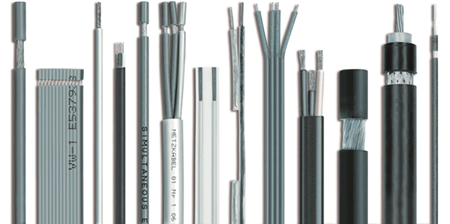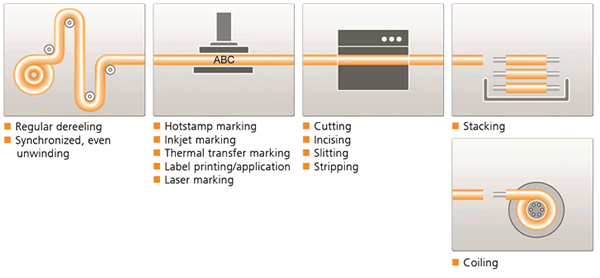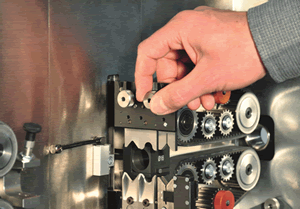Choosing the Right Cutting and Stripping Machine is All About the Apps
Choosing the Right Cutting and Stripping Machine is All About the Apps
Choosing a new wire cutting and stripping (C&S) machine can be like shopping for a new car: With so many choices, where does one start? A nice little sports car might be fun to own, but how often will it just sit in the driveway because it can’t carry a load of kids or some odd-sized goods from the home improvement store? If that’s your application range, you just might be better off with a midsize SUV that does a pretty good job at doing everything you need it to do.
Application Range
 When choosing a C&S machine, the most important consideration is the application range it must process. Some applications only require a machine that can measure, cut to length, and strip one or both ends of a wire or cable. This is considered basic and can be done using a machine with a cutter head that can only accept one set of blades.
When choosing a C&S machine, the most important consideration is the application range it must process. Some applications only require a machine that can measure, cut to length, and strip one or both ends of a wire or cable. This is considered basic and can be done using a machine with a cutter head that can only accept one set of blades.
Make a detailed list of the applications that you would like to process on your new cut and strip machine. List the wire type, outside diameter, overall lengths, strip lengths, and what applications you need to process now, as well as new applications you might want to process in the future.
More complex applications include intermediate window stripping and slitting, zipcord, coaxial cable, and power cord processing, as well as fully automatic stripping of the outer jacket and the inner conductors of multi-conductor cables. Other special applications include the cutting and stripping of fiber optic cable and stripping/slitting of flat ribbon cable. These more complex applications require a machine that has a cutter head that can accept multiple blade sets. A typical setup might include a set of V blades for cutting in position 1, a set of radius V blades for stripping in position 2, and a set of slitting blades for making intermediate window strips in position 3. The machine can be programmed to automatically select one or more of the blade sets, making it possible to process these complex applications.
Size Range
Once the application range is defined, the next most important consideration in the C&S machine selection process is the size range. What is the largest wire or cable size you need to process and what is the smallest size? Large copper cables with low strand counts need a lot of power for cutting and stripping. Large multi-conductor cables require a machine that can handle large cable diameters (O.D.), but typically do not require very high cutting and stripping forces.
On the small end of the range, precision is key. If you need to cut and strip a 30 AWG wire with a .010” center conductor and a .005” insulation wall thickness, there is little margin for error. C&S machines that can handle cables up to 1.0” and greater will most likely not have the precision required for wires on the very small end of the range.

Pre- and Post-Processing Accessories
Pre- and post-processing accessories can transform a basic C&S machine into a fully automatic production line. A pre-feeder ensures that wire is fed to the C&S with a constant tension, ensuring the best possible length accuracy. Pre-feeders are available in many sizes. Select a pre-feeder that can handle the largest, heaviest reel you plan to use as well as one that can keep up with the speed and acceleration of the C&S machine.
Do you need to mark the termination IDs on the wire ends or print and apply labels for identification? Various wire identification methods can be integrated into a C&S line. Hotstamp marking, inkjet marking, and labeling are common ID methods, to name just a few. Inkjet marking is desirable, since the wire or cable can be marked on the fly, whereas it must be stopped for hotstamp marking or labeling. A fully integrated inkjet marking system makes it possible to produce a complete wire list without any operator intervention. If inkjet marking is used in your wire processing operation, look for a cutting and stripping machine that can communicate with and control an inkjet marker.
Do you need to make intermediate windows or rotary incisions on the wire or cable? If so, you need a cutting and stripping machine with an integrated rotary stripping head. This type of system also makes it possible to measure and cut coaxial cables and perform a three-step strip on each end.
What good is a C&S machine that can process 5,000 pieces per hour if there is no way to collect and organize the wires as they are produced? Consider a machine that can interface with a wire stacker or coiler to maximize the production rate and efficiency of the operation.
Wire List Management Software
What if you want to go really lean and produce wires just in time for assembly at the harness board? To be able to produce a batch quantity of one, you cannot afford to have an operator changing parameters for every wire. In that case, you want to make sure your wire processing machine can process a wire list. With wire list processing capability, your machine will be able to produce each wire in the list, changing overall lengths, strip lengths, and inkjet text strings on the fly without any operator intervention. Some machines can process a wire list utilizing the user interface on the machine, however it is much easier to use a PC or laptop with wire list management software. Wire list management software typically has an import function, allowing you to import jobs directly from your ERP or other software systems.
Changeover Times
 Lean manufacturing is resulting in more high-mix, low-volume jobs, so you want to minimize changeover times as much as possible. With small batch sizes, changeover times become more important than the machine’s maximum production rate. In many cases, it takes less time to run a job than it does to set it up. Look for machines that offer quick changeover between jobs. Tool-less changeovers of guide tubes, blades, and other mechanical parts help to reduce changeover times. More advanced machines require less manual adjustments, further reducing changeover times.
Lean manufacturing is resulting in more high-mix, low-volume jobs, so you want to minimize changeover times as much as possible. With small batch sizes, changeover times become more important than the machine’s maximum production rate. In many cases, it takes less time to run a job than it does to set it up. Look for machines that offer quick changeover between jobs. Tool-less changeovers of guide tubes, blades, and other mechanical parts help to reduce changeover times. More advanced machines require less manual adjustments, further reducing changeover times.
Rotary stripping technology can be integrated into a conventional cut and strip machine. Since the rotary stripping head can be programmed to make incisions at any depth into the insulation, this design eliminates the need for changing blades (radius blades, die blades, etc.) when processing different wire or cable sizes. While the production rate is somewhat slower, no blade changeovers are required for processing different wire sizes. If you have small batch sizes and frequent changeovers, you may want to consider a cut and strip machine with rotary stripping technology for your cutting and stripping area.
Other Considerations
Product support hotlines, local support, experienced technicians, field service, PM contracts, and readily available spare parts are just as important to consider as the machine itself. If you are comparing machines from different vendors, make sure to compare services as well. All machines will need service at some point, so it’s best to evaluate and compare the services offered by the different vendors before deciding on which machine to purchase.
Just like you wouldn’t purchase a new car without test-driving it, do yourself a favor and make sure your new cutting and stripping machine will run all of your important applications. It’s best to send your wire and cable samples/specs to the vendor for testing to make sure your new C&S machine will be your daily driver.
By Pete Doyon, VP Product Management, Schleuniger
- Facts & Figures: Semiconductor Market Grew to a Record $336 Billion - March 2, 2015
- TLC and Metz Ethernet Cat 6A Patch Cords in Seven Vibrant Colors - January 27, 2014
- Cables Unlimited LC-LC Duplex Ruggedized Fiber Jumpers - January 27, 2014

